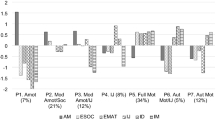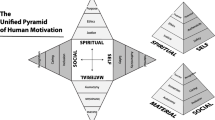Abstract
In the preceding article it was argued that control theory is not a useful paradigm for understanding work motivation. In doing so, three primary criticisms were presented: (a) that control theory, as originally formulated, does not adequately describe human behavior, (b) that modifications of control theory to describe human behavior have not been successful, and (c) that the use of logical deductions to develop a control theory model of work motivation is less efficacious than a grounded theory approach. In this reply, it will be shown that (a) the first criticism is not incorrect but is an inappropriate basis for criticism, (b) statements regarding modified control theory models are either inaccurate or premature, and (c) both inductive and deductive reasoning play an important role in theory development. In addressing these issues and in discussing the distinct advantages of current control theory models it will be shown that control theory does provide a viable paradigm for understanding work motivation.
Similar content being viewed by others
References
Campion, M. A., & Lord, R. G. (1982). A control systems conceptualization of the goal setting and changing process.Organizational Behavior and Human Performance, 30 265–287.
Carver, C. S., & Scheier, M. F. (1981).Attention and self-regulation: A control theory approach to human behavior. New York: Springer-Verlag.
Carver, C. S., & Scheier, M. F. (1982). Control theory: A useful conceptual framework for personality-social, clinical, and health psychology.Psychological Bulletin, 92 111–135.
Cook, D. M. (1968). The impact on managers of frequency of feedback.Academy of Management Journal, 11 263–277.
Dubin, R. (1969).Theory building. New York: Free Press.
Dubin, R. (1976). Theory building in applied areas. In M. D. Dunnette (Ed.),Handbook of industrial and organizational psychology. Chicago Rand-McNally.
Earley, P. C., Lee, C., & Lituchy, T. R. (1989).Task strategy and judgments in goal settings: Effects of learning goals and training sequencing on performance. Unpublished manuscript, University of Minnesota.
Glaser, B. G., & Strauss, A. L. (1967).The discovery of grounded theory. Chicago, Aldine.
Hollenbeck, J. R. (1989a). Control theory and the perception of work environments: The effects of focus of attention on affective and behavioral reactions to work.Organizational Behavior and Human Decision Processes, 43 406–430.
Hollenbeck, J. R. (1989b).Control theory and understanding motivated behavior. Debate at the 4th Annual Society of Industrial and Organizational Psychology Convention, Boston.
Hollenbeck, J. R., & Brief, A. P. (1988). Self-regulation in the workplace: Towards a unified approach to understanding worker attitudes and behaviors. In R. Schuler (Ed.),Readings in personnel and human resource management. St. Paul, MN: West.
Hollenbeck, J. R., & Williams, C. R. (1987). Goal importance, self-focus, and the goal setting process.Journal of Applied Psychology, 72 204–211.
Ilgen, D. R., Fisher, C. F., & Taylor, M. S. (1979). Consequences of individual feedback on behavior in organizations.Journal of Applied Psychology, 64 349–371.
Ivancevich, J. M., Donnelly, J. H., & Lyon, H. L. (1970). A study of the impact of management by objectives on perceived need satisfaction.Personnel Psychology, 23 139–151.
Kernan, M. C., & Lord, R. G. (1988). Effects of participative vs. assigned goals and feedback in a multitrial task.Motivation and Emotion, 12 75–86.
Kernan, M. C., & Lord, R. G. (1990). Effects of valence, expectancies, and goal-performance discrepancies in single and multiple goal environments.Journal of Applied Psychology, 75 194–203.
Klein, H. J. (1989). An integrated control theory model of work motivation.Academy of Management Review, 14 150–172.
Klein, H. J. (1990).Goal hierarchies and the goal setting process. Unpublished manuscript, The Ohio State University.
Klein, H. J., Whitener, E. M., & Ilgen, D. R. (1990). The role of goal specificity in the goal setting process.Motivation and Emotion, 14 179–193.
Lewin, K. (1958). Psychology of success and failure. In C. L. Stacey & M. F. Demartino (Eds.),Understanding human motivation. Cleveland: Howard Allen.
Lichtenstein, E. H., & Brewer, W. F. (1980). Memory for goal-directed events.Cognitive Psychology, 12 412–445.
Locke, E. A. (1968). Toward a theory of task motivation and incentives.Organizational Behavior and Human Performance, 3 157–189.
Locke, E. A., Cartledge, N. D., & Knerr, C. S. (1970). Studies of the relationship between satisfaction, goal setting and performance.Organizational Behavior and Human Performance, 5 135–158.
Locke, E. A., Chah, D., Harrison, S., & Lustgarten, N. (1989). Separating the effects of goal specificity from goal difficulty.Organizational Behavior and Human Decision Process, 43 270–287.
Locke, E. A., & Latham, G. P. (1990).A theory of goal setting and task performance. Englewood Cliffs, NJ: Prentice-Hall.
Locke, E. A., Shaw, K. N., Saari, L. M., & Latham, G. P. (1981). Goal setting and task performance: 1989–1980.Psychological Bulletin, 90 125–152.
Lord, R. G. (1989).Control theory and understanding motivated behavior. Debate at the 4th Annual Society of Industrial and Organizational Psychology Convention, Boston.
Lord, R. G., & Hanges, P. J. (1987). A control systems model of organizational motivation: Theoretical development and applied implications.Behavioral Science, 32 161–178.
Lord, R. G., & Kernan, M. C. (1989). Applications of control theory to work settings. In W. A. Hershberger (Ed.),Volitional action. Amsterdam: North-Holland.
Mace, C. A. (1935).Incentives: Some experimental studies (Report No. 72). Great Britain: Industrial Health Research Board.
Mackenzie, K. D., & House, R. (1978). Paradigm development in the social sciences: A proposed research strategy.Academy of Management Review, 3 7–23.
Matsui, T., Okada, A., & Inoshita, O. (1983). Mechanisms of feedback affecting task performance.Organizational Behavior and Human Performance, 31 114–122.
Platt, J. R. (1964). Strong inference,Science, 146 347–353.
Podsakoff, P. M., & Farh, J. (1989). Effects of feedback sign and credibility on goal setting and task performance: A preliminary test of some control theory propositions.Organizational Behavior and Human Decision Processes, 44 45–67.
Popper, K. R. (1961).The logic of scientific discovery. New York: Science Editions.
Powers, W. T. (1973).Behavior: The control of perception. Chicago: Aldine.
Powers, W. T. (1978). Quantitative analysis of purposive systems: Some spadework at the foundation of scientific psychology.Psychological Review, 85 417–435.
Saavedra, R., & Earley, P. C. (1990).Choice of task goal under conditions of general and specific affective inducement. Unpublished manuscript, University of Minnesota.
Stablein, R. E. (1989).Structure of debate in organizational studies. Paper presented at the 49th Annual Meeting of the National Academy of Management. Washington, DC.
Taylor, F. W. (1911).The principles of scientific management. New York: Norton.
Taylor, M. S. (1983).A control theory integration of performance goal and performance feedback research. Symposium at the 43rd National Academy of Management Convention, Dallas.
Taylor, M. S., Fisher, C. D., & Ilgen, D. R. (1984). Individuals' reactions to performance feedback in organizations: A control theory perspective.Research in Personnel and Human Resources management, 2 81–124.
Vance, R. J., & Colella, A. (1990). Effects of two types of feedback on goal acceptance and personal goals.Journal of Applied Psychology, 75 68–76.
Wiener, N. (1948).Cybernetics: Control and communication in the animal and the machine. Cambridge, MA: MIT Press.
Author information
Authors and Affiliations
Additional information
Thanks to John R. Hollenbeck for his helpful comments on this paper.
Rights and permissions
About this article
Cite this article
Klein, H.J. Control theory and understanding motivated behavior: A different conclusion. Motiv Emot 15, 29–44 (1991). https://doi.org/10.1007/BF00991474
Issue Date:
DOI: https://doi.org/10.1007/BF00991474




